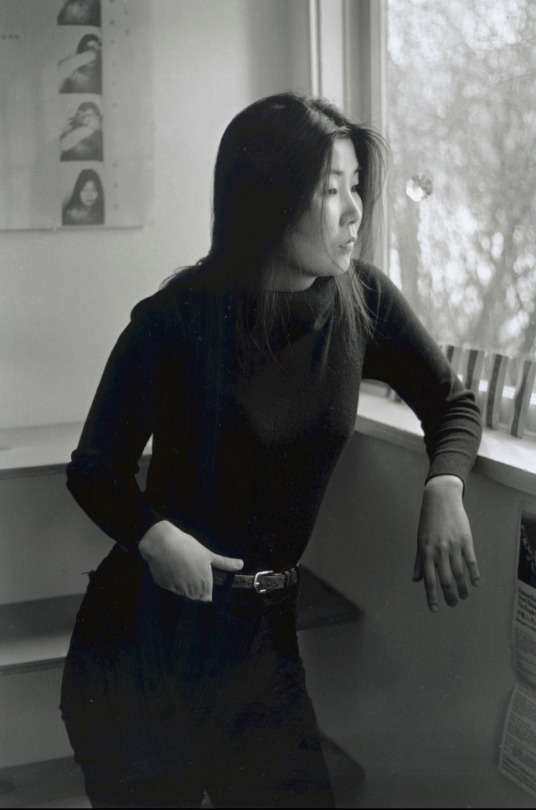#theresa hak kyung cha
Text

Theresa Cha | Life Mixing performance (1975), at University Art Museum, Berkeley.
In the exhibition No other cure none other than words in talking, the Staatliche Kunsthalle Baden-Baden is currently showing historical and contemporary female artists whose works are linked by the themes of language, memory and the experience of foreignness. The title of the exhibition is taken from the book Temps Morts by Theresa Hak Kyung Cha (1951, Busan, KOR - 1982, New York, USA).
In her lecture, Dr. Lisa Steib refers to the art that influenced Theresa Hak Kyung Cha's work in the Bay Area of California in the 1970s, especially the performance art that emerged in and around San Francisco during this period. In addition to Theresa Hak Kyung Cha, the lecture will focus on artists such as Terry Fox, Jim Melchert and Tom Marioni.
The lecture will be held in German.
48 notes
·
View notes
Text

Theresa Hak Kyung Cha, Aveugle Voix, 1975.
6 notes
·
View notes
Text




Theresa Hak Kyung Cha, A BLE W AIL, 1975, performance.
#theresa hak kyung cha#performance#in this piece i want to be the dream of the audience#el movimiento es similar al baile#theresa tiene un nombre sagrado y así sus investigaciones de gracia y devoción
11 notes
·
View notes
Text

Theresa Hak Kyung Cha in 1979
photo: James Cha
30 notes
·
View notes
Photo

theresa hak kyung cha, dictee (1982)
89 notes
·
View notes
Text

Richard Barnes | Theresa Hak Kyung Cha in about 1980, when she traveled to Seoul to work on a film project.
15 notes
·
View notes
Text

Dictee - Theresa Hak Kyung Cha
29 notes
·
View notes
Quote
When I came across Dictee in New York a few years ago, it was like receiving a dispatch, a linguistic memo I didn’t understand. It stayed with me, this dispatch, because (I now realize) as a German poet writing mostly in the language I was raised in, I was and am always in search of paths that lead me away: away from the sorts of understanding that I’ve inherited; away from my ways of thinking as an East-, perhaps post-East-, perhaps multi-German writer; away from the categories of estrangement and non-estrangement in my life, which has long swung like a pendulum between New York and Berlin. For me, being a multilingual writer means that words are always inscribed with ghost-words. Cha’s work was particularly relevant to my experience of multilayered cultural and linguistic self-estrangement.
Uljana Wolf, from her essay “Hidden Words | Searching for meaning in a rubber stamp”, translated by Sophie Seita, published in The Yale Review,
September 1, 2022
9 notes
·
View notes
Text
Void the words. Void the silence.
Bit by bit. Commas, periods, the
pauses. Before and after.
After having been. All.
Before having been.
Phrases silent
Paragraphs silent
Pages and pages a little nearer
to movement
line
after line
void to the left to the right.
Void the words.
Void the silence.”
— Theresa Hak Kyung Cha, Dictee (University of California Press; September 13, 2022)
21 notes
·
View notes
Photo

Theresa Hak Kyung Cha, Dictée
23 notes
·
View notes
Text
“She says to herself if she were able to write she could continue to live. Says to herself if she could write without ceasing. To herself if by writing she could abolish real time. She would live.”
Theresa Hak Kyung Cha, Dicteé
10 notes
·
View notes
Text

Author Theresa Hak Kyung Cha, in 1979. Photograph by James Cha
#theresa hak kyung cha#author#writing#literature#books#novels#short stories#nonfiction#publishing#asian authors#korean american#photography
6 notes
·
View notes
Text






Theresa Hak Kyung Cha, Pomegranate Offering, 1975.
#theresa hak kyung cha#artist book#boca y lágrimas rojas tejidas en hilo#investigación lírica sobre las estructuras del lenguaje
4 notes
·
View notes
Photo

theresa hak kyung cha, dictee (1982)
44 notes
·
View notes